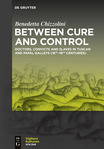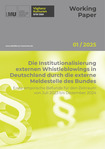Publications
New Releases
Carolina Heberling: Zwischen Alleinherrschaft und kollektiver Leitung. Der Intendantenberuf in der Weimarer Republik am Beispiel der Bayerischen Staatstheater. Berlin/Boston 2026.
DOI:
 Eine strenge Hierarchie mit einer mächtigen Person an der Spitze: Deutsche Theater sind noch immer stark auf die jahrhundertealte Figur des Intendanten ausgerichtet. Teile seiner heutigen Prägung bekam das Amt in den 1920er Jahren, als viele Hoftheater in die Hand des Staates übergingen und die „Kavaliersintendanten" – adelige Höflinge mit begrenzter Expertise – durch Berufsprofis ersetzt wurden. Am Beispiel der Bayerischen Staatstheater geht das Buch der Frage nach, wie sich das Berufsbild des Intendanten in der Weimarer Republik entwickelte und wo sich mit der Etablierung eines Künstlerrats als gemeinschaftlicher Leitungsform früh eine Alternative zum Modell des Alleinherrschers" zeigte. Es wird untersucht, welche Personen das Amt anzog, wie diese sich an der Spitze des Theaters legitimierten und welche Idealbilder vom Theater an sie herangetragen wurden. In den Blick rücken dafür beispielhaft Clemens von Franckenstein, Victor Schwanneke und Karl Zeiß. Anhand ihrer Intendanzen lässt sich eine strukturelle Überforderung ablesen, die den Beruf seither begleitet und eine konsistente Amtsführung schon damals unmöglich machte, so eine zentrale These des Buchs. Aus historischer Perspektive betrachtet wird die Frage nach kollektiven Leitungsformen an heutigen Theatern umso drängender.
Eine strenge Hierarchie mit einer mächtigen Person an der Spitze: Deutsche Theater sind noch immer stark auf die jahrhundertealte Figur des Intendanten ausgerichtet. Teile seiner heutigen Prägung bekam das Amt in den 1920er Jahren, als viele Hoftheater in die Hand des Staates übergingen und die „Kavaliersintendanten" – adelige Höflinge mit begrenzter Expertise – durch Berufsprofis ersetzt wurden. Am Beispiel der Bayerischen Staatstheater geht das Buch der Frage nach, wie sich das Berufsbild des Intendanten in der Weimarer Republik entwickelte und wo sich mit der Etablierung eines Künstlerrats als gemeinschaftlicher Leitungsform früh eine Alternative zum Modell des Alleinherrschers" zeigte. Es wird untersucht, welche Personen das Amt anzog, wie diese sich an der Spitze des Theaters legitimierten und welche Idealbilder vom Theater an sie herangetragen wurden. In den Blick rücken dafür beispielhaft Clemens von Franckenstein, Victor Schwanneke und Karl Zeiß. Anhand ihrer Intendanzen lässt sich eine strukturelle Überforderung ablesen, die den Beruf seither begleitet und eine konsistente Amtsführung schon damals unmöglich machte, so eine zentrale These des Buchs. Aus historischer Perspektive betrachtet wird die Frage nach kollektiven Leitungsformen an heutigen Theatern umso drängender.
Benedetta Chizzolini: Between Cure and Control. Doctors, Convicts and Slaves in Tuscan and Papal Galleys (16th–18th Centuries). Berlin/Boston 2025.
DOI: https://doi.org/10.1515/9783111654133
 Since antiquity, doctors have always been required to be "vigilant" (i.e., extremely attentive), particularly when it comes to any symptoms exhibited and/or complained of by the patient. As outlined in the Hippocratic Oath since antiquity, a doctor’s primary mission is to ensure the patient’s well-being and recovery, irrespective of their social status. However, loyalty to the patient was explicitly subordinated whenever the patient performed an action deemed suspicious or even detrimental to society’s best interests. The goal of this book is, therefore, to delve deeper into the multivalent role and attitude of physicians and surgeons as "experts" in how to interpret symptoms, and how this, in turn, influenced their relationship with their patients, especially when the latter were considered to be "dangerous individuals". This analysis does not seek to further explore Foucault’s concept of the "disciplinary" nature of medicine, but rather uses it as a starting point for analyzing the complex and, so to speak, "ambiguous" nature of the doctor-patient relationship in the early modern period, one which oscillated between cooperation and conflict. To deepen these aspects, this analysis will consider the role and tasks of a figure often neglected by historiography: the galley doctor.
Since antiquity, doctors have always been required to be "vigilant" (i.e., extremely attentive), particularly when it comes to any symptoms exhibited and/or complained of by the patient. As outlined in the Hippocratic Oath since antiquity, a doctor’s primary mission is to ensure the patient’s well-being and recovery, irrespective of their social status. However, loyalty to the patient was explicitly subordinated whenever the patient performed an action deemed suspicious or even detrimental to society’s best interests. The goal of this book is, therefore, to delve deeper into the multivalent role and attitude of physicians and surgeons as "experts" in how to interpret symptoms, and how this, in turn, influenced their relationship with their patients, especially when the latter were considered to be "dangerous individuals". This analysis does not seek to further explore Foucault’s concept of the "disciplinary" nature of medicine, but rather uses it as a starting point for analyzing the complex and, so to speak, "ambiguous" nature of the doctor-patient relationship in the early modern period, one which oscillated between cooperation and conflict. To deepen these aspects, this analysis will consider the role and tasks of a figure often neglected by historiography: the galley doctor.
Ralf Kölbel: Die Institutionalisierung externen Whistleblowings in Deutschland durch die externe Meldestelle des Bundes. Erste empirische Befunde für den Zeitraum von Juli 2023 bis Dezember 2024. Working Paper des Sonderforschungsbereichs 1369 ,Vigilanzkulturen' 1 (2025).
 Unter Whistleblowing versteht man üblicherweise „the disclosure by organization members (former or current) of illegal, immoral, or illegitimate practices under the control of their employers, to persons or organizations that may be able to effect action“.
Unter Whistleblowing versteht man üblicherweise „the disclosure by organization members (former or current) of illegal, immoral, or illegitimate practices under the control of their employers, to persons or organizations that may be able to effect action“.
Kennzeichnend ist die Enthüllung von Missständen innerhalb einer Organisation oder aus dieser heraus, wobei dies in normativ erwartungswidriger Weise erfolgt: Beim Whistleblowing verlässt der Insider die regulären Mitteilungskanäle, d.h. den (beim direkten Vorgesetzten beginnenden) Dienstweg. Geschieht das durch Meldung bei unternehmenseigenen Anlaufstellen (Compliance-Abteilung, interne Revision usw.), wird dies als internes Whistleblowing bezeichnet. Um dessen externe Variante handelt es sich hingegen, wenn die Information gegenüber Strafverfolgungsbehörden, Medien usw. erfolgt.
Bei der externen Meldestelle des Bundes handelt es sich um eine Institution, die im Sommer 2023 speziell zur Entgegennahme von externem Whistleblowing eingerichtet worden ist. Für die Einordnung der Befunde und Beobachtungen, die im vorliegenden Paper zu dieser Meldestelle vorgestellt werden können, ist es hilfreich, neben
ihrer regulatorischen Einbindung und Ausgestaltung auch die bisherige Forschung zu externem Whistleblowing in einigen zentralen Punkten zu rekapitulieren.

